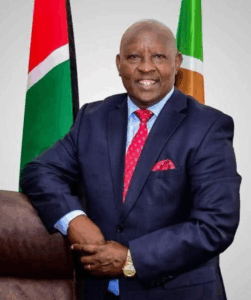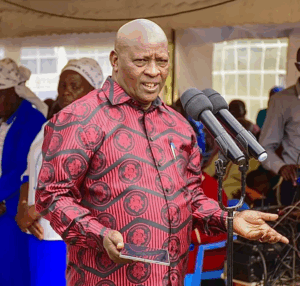Mutahi Kahiga Biography: Early Life & Education, Family, Net Worth & Achievements. From Classroom to County Leadership
Today let’s talk about Mutahi Kahiga Biography: In the heart of Kenya’s Central region lies Nyeri County, a place steeped in history and tradition. At its helm stands a man whose journey from humble beginnings to the governor’s seat reads like a testament to perseverance, dedication, and the transformative power of education. Edward Mutahi Kahiga’s story is not just about political ascendancy; it’s about a life dedicated to service, shaped by modest origins, and driven by an unwavering commitment to uplifting others.
Mutahi Kahiga Biography
Mutahi Humble Beginning in Gitathi-ini
Born in 1961 in the small village of Gitathi-ini in Nyeri County, Mutahi Kahiga entered a world far removed from the corridors of power he would later navigate. His father worked as a waiter at the Kiganjo Police College mess, earning a modest income that had to stretch across a large family. As the firstborn of nine children, including two brothers and six sisters, young Mutahi learned early the values of responsibility, hard work, and resilience. In 1962, when he was barely a year old, the family relocated to Kiganjo Police College, where they lived adjacent to the college mess despite their limited financial means.
Growing up in this environment, Kahiga witnessed firsthand the dignity of honest labor and the importance of education as a pathway to opportunity. His father’s dedication to providing for such a large family on a waiter’s salary instilled in him a deep appreciation for the struggles of ordinary Kenyans, a perspective that would later inform his approach to governance and public service.

Mutahi Kahiga Educational Journey
Kahiga’s educational journey began in 1965 at Kiganjo Primary School, laying the foundation for what would become a lifelong commitment to learning and education. From 1973 to 1976, he attended St. Mary’s High School in Nyeri town, where he completed his East Africa Certificate of Education. After finishing secondary school, the young Kahiga faced the economic realities that many Kenyan families encounter. He worked briefly as a photographer, earning a mere two hundred shillings per month in 1977, a sum that barely covered basic necessities but provided him with valuable work experience and independence.
In May 1978, opportunity knocked when Kahiga gained admission to Kisii Teacher Training College to pursue a P1 certificate course. This marked a turning point in his life, setting him on a path that would define his career for the next three decades. He graduated in 1980, ready to embark on what would become a distinguished teaching career. But Kahiga’s thirst for knowledge didn’t end there. Recognizing the importance of continuous learning, he pursued higher education even while teaching, completing a Bachelor’s degree in Education from the University of Nairobi in 2006. His academic journey continued with a Master’s degree in Education Leadership and Management from Kenya Methodist University, which he completed in 2020. Not content to rest on his laurels, Kahiga is currently pursuing a PhD at the same institution in Education Management and Leadership, demonstrating that learning truly is a lifelong endeavor.
Mutahi Kahiga Three Decades in the Classroom
After graduating from Kisii Teacher Training College with his P1 certificate, Kahiga’s first posting took him to Baringo Central, far from his home in Nyeri. For six years, from 1980 to 1986, he dedicated himself to shaping young minds in this distant posting, experiencing firsthand the challenges and rewards of teaching in different environments. In 1986, he transferred back to Nyeri County, where he would spend the remainder of his teaching career, spanning over 25 years in total.
Throughout his 32-year teaching career, Kahiga was more than just a classroom instructor. He served as a football and athletics coach, recognizing the importance of holistic education that develops both mind and body. His passion for sports and youth development became evident as he guided students not only in academics but also in discovering their athletic potential. He rose through the teaching ranks, eventually becoming a headteacher, where he could influence school policy and create environments conducive to learning and growth.
Mutahi Kahiga Champion for Teachers’ Rights
Beyond his classroom duties, Kahiga became deeply involved in advocacy for teachers’ welfare through the Kenya National Union of Teachers (KNUT). His involvement wasn’t casual; he served as the Executive Secretary of KNUT in Nyeri for seven years, becoming a voice for teachers across the county and the broader Central Kenya region. In this role, he fought for better working conditions, fair compensation, and the professional recognition that teachers deserve. His leadership in KNUT demonstrated his ability to organize, negotiate, and advocate effectively, skills that would prove invaluable in his later political career.
Kahiga’s commitment to sports administration also flourished during this period. He successfully steered the Regional Athletics Kenya Association as Secretary General for ten years, contributing to the development of athletics in the region. This dual role in education and sports administration showcased his versatility and his genuine commitment to community development beyond the confines of his day job.
Mutahi Kahiga Unexpected Political Journey
The year 2017 marked a dramatic shift in Kahiga’s life trajectory. The teachers’ union had been advocating for teacher representation in county leadership, and Kahiga emerged as their candidate for deputy governor. Running alongside Wahome Gakuru under the Jubilee Party ticket, Kahiga brought his educational background and grassroots credibility to the campaign. The connection between Gakuru and Kahiga ran deep; they had grown up in the same area, and their fathers had worked together, creating a natural bond and shared vision for Nyeri County.
The Gakuru-Kahiga ticket resonated with voters, and they won decisively in the August 2017 General Election. For Kahiga, this represented a validation of the idea that educators could contribute meaningfully to governance, bringing their experience in leadership, management, and community service to the political arena. The victory seemed to promise a new chapter for Nyeri County, with experienced leadership ready to guide the county forward.
Mutahi Kahiga Tragedy and Unexpected Ascension
Just three months after the election, tragedy struck. On November 7, 2017, Governor Wahome Gakuru died in a road accident at Kabati near Thika along the Thika-Murang’a road, caused by a burst tire. The loss devastated not only Gakuru’s family but the entire county, which had just elected him to lead them. For Kahiga, the loss was both personal and profound. He had lost a friend, a colleague, and a partner in the vision they had crafted for Nyeri.
According to constitutional provisions, the deputy governor automatically assumes the office of governor in such circumstances. On November 13, 2017, Mutahi Kahiga was sworn in as the fourth Governor of Nyeri County. The transition was far from smooth. Some politicians questioned whether a primary school teacher could effectively lead a county government, pushing for a by-election instead. Kahiga himself initially expected a by-election, having had no plans to run for the top position. He took office devastated by the loss of his running mate and without experience in running a government, facing skepticism and political opposition.
Mutahi Kahiga Rising to the Challenge
Despite the difficult circumstances, Governor Kahiga focused on implementing the vision he and Gakuru had shared during the campaign. He prioritized agriculture, recognizing its importance to Nyeri’s economy and the livelihoods of its residents. Road infrastructure became another focus area, understanding that connectivity drives economic development and improves residents’ quality of life. Education infrastructure received significant investment, reflecting Kahiga’s lifelong commitment to learning, and health facilities were upgraded to ensure better healthcare access for county residents.
One of his notable achievements was hiring 800 Early Childhood Development and Education (ECDE) teachers, addressing a critical gap in early education. Through World Bank funding, his administration constructed a 350 million shilling Narumoru Level 4 Hospital and a 600 million shilling modern bus park in Nyeri town, infrastructure projects that would serve residents for generations. Staff motivation became another priority, as Kahiga understood from his years in KNUT that motivated workers deliver better services.
The results spoke for themselves. Under Kahiga’s leadership, Nyeri County underwent a dramatic transformation, rising from number 45 to number one in World Bank ranking assessments by 2022. This remarkable turnaround validated Kahiga’s leadership and silenced many of his early critics who had doubted whether a teacher could govern effectively.
The 2022 Re-Election Victory
As the 2022 general elections approached, Governor Kahiga made the decision to seek a full term in his own right. This time running on the United Democratic Alliance (UDA) party ticket with businessman David Kinaniri Waroe as his running mate, Kahiga campaigned on his record of transformation and development. The voters responded overwhelmingly, giving him 213,373 votes and a victory margin of over 100,000 votes against his closest rival, Dr. Thuo Mathenge. The landslide victory represented a clear endorsement of his leadership and a rejection of the early skepticism about his capabilities.
This electoral success was particularly significant because it showed that Kahiga had won the confidence of Nyeri residents based on his performance, not just constitutional succession. He had proven that effective leadership comes not from one’s original profession but from dedication, vision, and the ability to deliver results.
The Man Behind the Office
Beyond the titles and political achievements, Mutahi Kahiga remains grounded in his personal values and commitments. He is married to Carol Wamaitha, and together they have four children, two girls and two boys. Family remains important to him, providing the foundation and support system that enables his public service.
Kahiga’s faith journey is particularly interesting. He got saved in 1993 and became a pastor, adding spiritual leadership to his already diverse portfolio. However, in 2011, when elected to the Kenya National Union of Teachers, he made the conscious decision to step back from active ministry. He felt it would be inappropriate to advocate for strikes one day as a union leader and preach from the pulpit the next. This decision reflected his integrity and his commitment to avoiding conflicts between his various roles.
An avid sports enthusiast, Kahiga is a fan of both AFC Leopards and Chelsea Football Club. During his younger years, he was an active footballer himself, serving as a goalkeeper. This passion for sports informed his work as an athletics coach and his leadership in sports administration, demonstrating that his interests genuinely aligned with the roles he took on throughout his career.
Mutahi Kahiga Current Leadership Role
Today, Governor Mutahi Kahiga serves not only as the Governor of Nyeri County but also as Vice Chair of the Council of Governors and CEREB Chair, positions that extend his influence beyond Nyeri to the broader devolution conversation in Kenya. As a county governor, he earns a gross salary of 990,000 shillings, along with benefits including retirement gratuity equivalent to 31 percent of annual pensionable income and group life insurance valued at three times his annual pensionable earnings.
These roles allow him to contribute to policy discussions affecting all of Kenya’s 47 counties, bringing his unique perspective as someone who worked for decades in the education sector before entering politics. His voice in these forums carries the weight of both practical experience in public service and proven success in county leadership.

Frequently Asked Questions about Mutahi Kahiga
What was Mutahi Kahiga’s profession before becoming governor?
Before entering politics, Mutahi Kahiga was a primary school teacher for 32 years. He began teaching in 1980 after graduating from Kisii Teacher Training College and served in various capacities including as a classroom teacher, football and athletics coach, and eventually as a headteacher. He also served as Executive Secretary of the Kenya National Union of Teachers in Nyeri for seven years and as Secretary General of the Regional Athletics Kenya Association for ten years. His extensive background in education and advocacy for teachers’ welfare shaped his approach to leadership and governance.
How did Mutahi Kahiga become Governor of Nyeri County?
Mutahi Kahiga became governor through constitutional succession after a tragic accident. In the August 2017 General Election, he was elected deputy governor on a ticket with Wahome Gakuru under the Jubilee Party. However, just three months after taking office, on November 7, 2017, Governor Gakuru died in a road accident near Thika. According to Kenya’s constitution, when a governor dies in office, the deputy governor automatically assumes the position. Kahiga was sworn in as the fourth Governor of Nyeri County on November 13, 2017, and later won re-election in 2022 in his own right.
What are some of Governor Kahiga’s major achievements in Nyeri County?
Under Governor Kahiga’s leadership, Nyeri County experienced significant transformation across multiple sectors. He hired 800 ECDE teachers to strengthen early childhood education, constructed a 350 million shilling Narumoru Level 4 Hospital through World Bank funding, and built a 600 million shilling modern bus park in Nyeri town. His administration prioritized agriculture, road infrastructure, education facilities, healthcare improvement, and staff motivation. Perhaps most impressively, Nyeri County rose from number 45 to number one in World Bank ranking assessments by 2022, demonstrating substantial improvement in governance and service delivery.
What is Mutahi Kahiga’s educational background?
Governor Kahiga has pursued education throughout his life. He attended Kiganjo Primary School starting in 1965 and St. Mary’s High School in Nyeri from 1973 to 1976. He then joined Kisii Teacher Training College in 1978, graduating with a P1 certificate in 1980. While working as a teacher, he continued his education, earning a Bachelor’s degree in Education from the University of Nairobi in 2006. He later completed a Master’s degree in Education Leadership and Management from Kenya Methodist University in 2020. Currently, he is pursuing a PhD at Kenya Methodist University in Education Management and Leadership, demonstrating his commitment to lifelong learning.
What political party does Mutahi Kahiga belong to?
Governor Mutahi Kahiga currently belongs to the United Democratic Alliance (UDA) party, which is the party under which he successfully ran for re-election in 2022. However, he began his political career under the Jubilee Party, which was the ruling party when he was first elected as deputy governor in 2017. His move to UDA reflected the changing political landscape in Kenya and the Mount Kenya region, as UDA became the dominant party supporting President William Ruto’s administration.
Conclusion
The story of Mutahi Kahiga is fundamentally a story about the power of dedication, continuous learning, and authentic service to one’s community. From his humble beginnings as the son of a waiter in Gitathi-ini village to his current position as one of Kenya’s most successful county governors, Kahiga has consistently demonstrated that leadership potential is not determined by one’s starting point but by one’s commitment to growth and service.
His 32-year career in education was not merely a job but a calling that prepared him for broader leadership responsibilities. Through teaching, he learned patience, the importance of clear communication, and how to develop potential in others. Through his union work, he learned advocacy, negotiation, and the courage to stand up for what is right even when facing powerful opposition. Through sports administration, he learned teamwork, strategy, and the importance of fair play.
When thrust unexpectedly into the governor’s office following the tragic death of Wahome Gakuru, Kahiga could have been overwhelmed by the circumstances. Instead, he drew on his decades of experience in leadership, his educational background, and his deep connection to the people of Nyeri to navigate the challenges and deliver results. His critics doubted whether a teacher could govern effectively, but Kahiga proved that good governance requires the same skills that make great educators: vision, patience, the ability to bring out the best in people, and an unwavering commitment to the welfare of those you serve.
The transformation of Nyeri County from number 45 to number one in World Bank rankings stands as objective evidence of his effectiveness. The overwhelming mandate he received in the 2022 elections, winning by over 100,000 votes, demonstrates that the people of Nyeri recognize and appreciate the leadership he has provided. But perhaps more importantly, Kahiga has shown a generation of Kenyan youth that leadership opportunities are not reserved for those born into privilege or political dynasties. With education, hard work, and genuine commitment to service, anyone can rise to positions of influence and use that influence to transform lives.
As he continues to lead Nyeri County and contribute to national conversations on devolution through his role as Vice Chair of the Council of Governors, Mutahi Kahiga remains grounded in the values that shaped him: humility, continuous learning, faith, and an unwavering commitment to improving the lives of ordinary Kenyans. His journey from classroom to county leadership is not just his story; it is a story of possibility for all who dare to dream, work hard, and remain true to their values. In Governor Mutahi Kahiga, Nyeri County has not just a competent administrator but a role model whose life demonstrates that true leadership is about service, not status, and that the greatest achievements often come from the most unexpected places.
